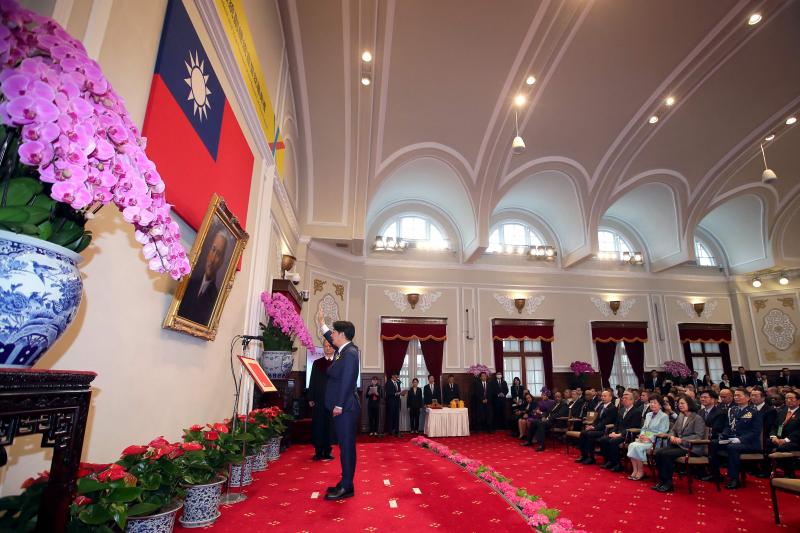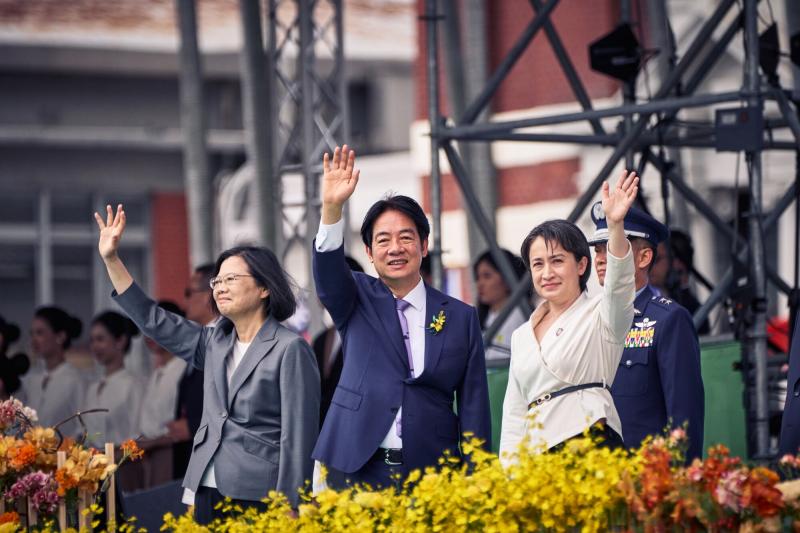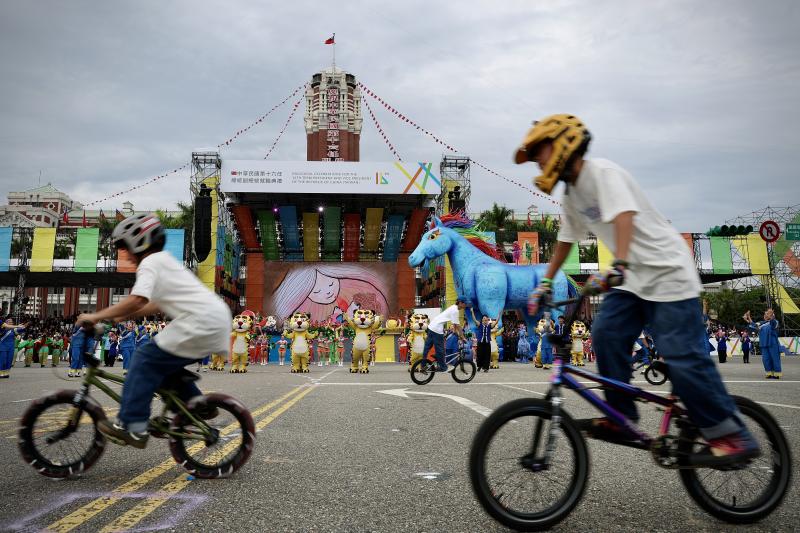President William Lai (賴清德) and Vice President Hsiao Bi-khim (蕭美琴) were sworn into office on Monday morning as the fifth popularly elected leaders of Taiwan.
Outgoing president Tsai Ing-wen (蔡英文) also attended the inauguration ceremony at the Presidential Office in Taipei, where Lai received the great seal of the nation from Legislative Speaker Han Kuo-yu (韓國瑜) to symbolize his assumption of office.
Lai’s first official duty was to sign a document officially appointing Cho Jung-tai (卓榮泰) as premier, Pan Men-an (潘孟安) as secretary-general of the Presidential Office and Joseph Wu (吳釗燮) as secretary-general of the National Security Council.

Photo courtesy of the Taipei News Photographer Association via AFP
He then presided over the swearing-in ceremonies of senior officials before he and Hsiao received foreign guests in attendance.
A total of 51 groups of 508 foreign dignitaries are attending the inauguration ceremony and related activities, the Ministry of Foreign Affairs said.
The ceremony was followed by music and cultural performances outside of the Presidential Office before Lai was set to deliver his inaugural speech at 11am.

Photo: An Rong Xu, Bloomberg

Photo: CNA

Photo: Ritchie B. Tongo, EPA-EFE

CHAOS: Iranians took to the streets playing celebratory music after reports of Khamenei’s death on Saturday, while mourners also gathered in Tehran yesterday Iranian Supreme Leader Ayatollah Ali Khamenei was killed in a major attack on Iran launched by Israel and the US, throwing the future of the Islamic republic into doubt and raising the risk of regional instability. Iranian state television and the state-run IRNA news agency announced the 86-year-old’s death early yesterday. US President Donald Trump said it gave Iranians their “greatest chance” to “take back” their country. The announcements came after a joint US and Israeli aerial bombardment that targeted Iranian military and governmental sites. Trump said the “heavy and pinpoint bombing” would continue through the week or as long

TRUST: The KMT said it respected the US’ timing and considerations, and hoped it would continue to honor its commitments to helping Taiwan bolster its defenses and deterrence US President Donald Trump is delaying a multibillion-dollar arms sale to Taiwan to ensure his visit to Beijing is successful, a New York Times report said. The weapons sales package has stalled in the US Department of State, the report said, citing US officials it did not identify. The White House has told agencies not to push forward ahead of Trump’s meeting with Chinese President Xi Jinping (習近平), it said. The two last month held a phone call to discuss trade and geopolitical flashpoints ahead of the summit. Xi raised the Taiwan issue and urged the US to handle arms sales to

State-run CPC Corp, Taiwan (CPC, 台灣中油) yesterday said that it had confirmed on Saturday night with its liquefied natural gas (LNG) and crude oil suppliers that shipments are proceeding as scheduled and that domestic supplies remain unaffected. The CPC yesterday announced the gasoline and diesel prices will rise by NT$0.2 and NT$0.4 per liter, respectively, starting Monday, citing Middle East tensions and blizzards in the eastern United States. CPC also iterated it has been reducing the proportion of crude oil imports from the Middle East and diversifying its supply sources in the past few years in response to geopolitical risks, expanding

OTHER OPTIONS: Given possible US intervention and Taiwanese counterattacks, China might opt to blockade Taiwan or take its outlying islands instead of an all-out invasion A US think tank has urged Taiwan to adopt a “hellscape” strategy that would flood the Taiwan Strait with drones and other uncrewed systems to deter invasion by China. In its report, Hellscape for Taiwan, published on Thursday, the Center for a New American Security said Taipei’s asymmetric defense approach — often described as a “porcupine strategy” — needs to evolve to keep pace with the growing capabilities of the Chinese People’s Liberation Army. The “hellscape” strategy involves saturating the air and waters around Taiwan with thousands of drones and other platforms capable of striking invading forces from multiple domains at once. Long-range